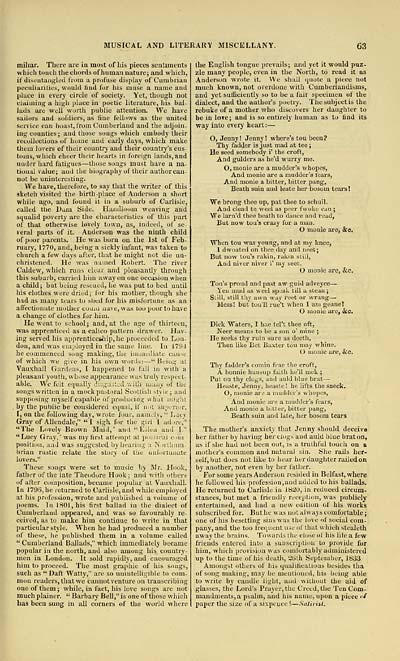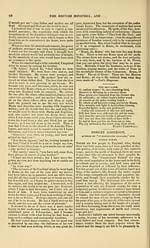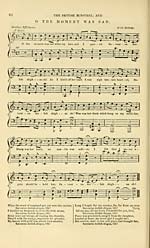Glen Collection of printed music > Printed music > British minstrel, and musical and literary miscellany
(71) Page 63
Download files
Complete book:
Individual page:
Thumbnail gallery: Grid view | List view

MUSICAL AND LITERARY MISCELLANY.
63
miliar. Tlicre ave in most of his pieces sentiments
wliich timcli tlie chords of human nature; and vvliich,
if disentangled fniin a profuse display of Cumbrian
pecidiarities, would lind for his muse a name and
place in every circle of society. Yet, though not
claiming a high place in poetic literature, his bal-
lads are well worth public attention. We have
sailors and soldiers, as line fellows as the united
Service can boast, from Cumberland and the adjoin-
ing counties; and those songs which embody their
recollections of home and early days, which make
them lovers of their country and their country's cus-
toms, which cheer their hearts in foreign lands, and
under hard fatigues — those songs must have a na-
tiomd value; and the biography of their author can-
not be uninteresting.
We have, therefore, to say that the writer of this
sketch visited the birthplace of Anderson a short
while ago, and found it in a suburb of Carlisle,
called the Dam Side. Handlocjm weaving and
squalid poverty are the characteristics of this part
of that otherwise lovely town, as, indeed, of se.
veral parts of it. Anderson was the ninth child
of poor parents. He was born on the 1st of Feb-
ruary, 1770, and, being a sickly infant, was taken to
church a few days after, that he might not die un-
christencd. He was named Robert. Tlie river
Caldew, which runs clear and pleasantly through
this suburb, carried him away on one occasion when
a child; but being rescued, he was put to bed until
liis clothes were dried; for his mother, though she
had as many tears to siicd for his misibrtune as an
affectionate mother coum nave, was too pour to have
a change of clothes for him.
He went to school; and, at the age of thirteen,
was apprenticed as a calico pattern drawer. Hav-
ing served his apprenticesJiip, he proceeded to Lon-
don, and was employed in the same line. In 179J
he commenced snug making, the immediate cau-ie
of which we give in his own wor;ls: — " Buicig at
Vauxhall Gardens, I happened to fall in with a
pleasant youth, whose appearance was truly respect-
able. W'c felt equally disgustijd v.itU many of the
songs written in a mock pastoral Scottish style; and
supposing myself capable of producing what jnight
. by the public be considered equiil, if ujt supinor,
I, on the following day, wrote four, namely, " Lucy
Gray of Allendale," " I sigh for tbe girl I adare,"
"Tile Lovely Brown Maid,' ami "Fi^Ueo and 1."
"Lucy Gray, ' was my Hrsl attempt at pnLlical cuo
position, and was suggested by hearing a Notlnim.
brian rustic relate the story of tiie unfortunate
lovers."
These songs were set to music by Blr. Hook,
father of the late Theodore Hook; and witli others
of after composition, became popular at Vauxhall.
In 1796, he returned to Carlisle, and while employed
at his profession, wrote and published a volume of
poems. In 1801, his first ballad in the dialect of
Cumberland appeared, and was so I'avourably re
ceived, as to make him continue to write in that
particular style. When he had produced a number
of these, he published them in a volume called
" Cumberland Ballads," which immediately became
popular in the north, and also among his country-
men in London. It sold rapidly, and encouraged
him to proceed. The most grajdiic of his songs,
such as " Daft Watty," are so unintelligible to com-
mon readers, that we cannot venture on transcribing
one of them ; while, in fact, his love songs are not
much plainer. " Barljary Bell," is one of those which
has been sung in all corners of the world where
the English tongue prevails; and yet it would puz-
zle many people, even in the North, to read it as
Anderson wrote it. We shall quote a piece not
much known, not overdone with Cumberiandisms,
and yet sufficiently so to be a fair specimen of the
dialect, and the author's poetry. The subject is the
rebuke of a mother who discovers her daughter to
be in love; and is so entirely human as to hnd its
way into every heart: —
O, Jenny I Jenny 1 where's ton been ?
Thy fadder is just mad at tee ;
He seed somebody i' the croft,
And gulders as he'd wurry me.
O, monie are a mudder's whopes.
And monie are a mudder's fears,
And monie a bitter, bitter pang,
Beath suin and leate her bosom tears I
We brong thee up, pat thee to schuil.
And dead te weel as peer fwoke can ;
\Vc lai'n'd thee beath to dance and read,
But now tou's era^y for a man.
O monie are, &c.
■WTien ton was young, and at my knee,
1 dvvoated on thee day and neet ;
But now tou's rakin, rakin still,
And niver niver i' my sect.
O monie arc, &c.
Tou's proud and past aw guid adveyce — ■
Yen mud as weel speak till a stean ;
StUl, still thy awn way reet or wrang —
Mess I but tou'll rue't when I am geanel
O monie ai'e, &c.
Dick Waters, I liae tol't thee oft,
Neer means to be a son o' mine ;
He seeks thy rain sure as deeth.
Then like Bet Baxter tou may whine.
O monie are, &c.
Thy fadder's comin fi'ae the croft,
A bonnie hunsup faith he'll mek ;
Put on thy clogs, and auld blue brat —
Heaste, Jenny, heaste! be lifts the sneck.
O, monie are a nuidder's uhopcs.
And monie are a mudder's fears,
And monie a bitter, bitter pang,
Beath siun and late, her bosom tears
The mother's anxiety that Jenny shouhl deceive
her fatlier by having her clogs and auld blue brat on,
as if she had not been out, is a truthful touch on a
mother's coumion and natural sin. She rails her-
self, but does not like to hear her daughter railed on
by another, not even by her lather.
For some years Anderson resided in Belfast, where
he followed his profession, and added to his ballads.
He returned to Carlisle in 182U, in reduced circum-
stances, but met a friendly reception, was publicly
entertained, and had a new edition of his works
subscribed ibr. But he was not always comfortable ;
one of his besetting sins was the love of social com-
pany, and the too frequent use of that which stealeth
away the brains. TowartLs the close of his lil'e a few
friends entered into a subscriptimi to provide for
him, which jirovision was comlortably administered
up to the time of his death, "idth September, 1833
Amongst others of his qualifications besides tha
of song making, may be mentioned, his being able
to write by candle light, aatl without ilie aid of
glasses, the Lord's Prayer, the Creed, the Ten Com-
mandments, a psalm, and his name, upon a piece '■/
paper the size of a sixpence ! — Sixtiriit.
63
miliar. Tlicre ave in most of his pieces sentiments
wliich timcli tlie chords of human nature; and vvliich,
if disentangled fniin a profuse display of Cumbrian
pecidiarities, would lind for his muse a name and
place in every circle of society. Yet, though not
claiming a high place in poetic literature, his bal-
lads are well worth public attention. We have
sailors and soldiers, as line fellows as the united
Service can boast, from Cumberland and the adjoin-
ing counties; and those songs which embody their
recollections of home and early days, which make
them lovers of their country and their country's cus-
toms, which cheer their hearts in foreign lands, and
under hard fatigues — those songs must have a na-
tiomd value; and the biography of their author can-
not be uninteresting.
We have, therefore, to say that the writer of this
sketch visited the birthplace of Anderson a short
while ago, and found it in a suburb of Carlisle,
called the Dam Side. Handlocjm weaving and
squalid poverty are the characteristics of this part
of that otherwise lovely town, as, indeed, of se.
veral parts of it. Anderson was the ninth child
of poor parents. He was born on the 1st of Feb-
ruary, 1770, and, being a sickly infant, was taken to
church a few days after, that he might not die un-
christencd. He was named Robert. Tlie river
Caldew, which runs clear and pleasantly through
this suburb, carried him away on one occasion when
a child; but being rescued, he was put to bed until
liis clothes were dried; for his mother, though she
had as many tears to siicd for his misibrtune as an
affectionate mother coum nave, was too pour to have
a change of clothes for him.
He went to school; and, at the age of thirteen,
was apprenticed as a calico pattern drawer. Hav-
ing served his apprenticesJiip, he proceeded to Lon-
don, and was employed in the same line. In 179J
he commenced snug making, the immediate cau-ie
of which we give in his own wor;ls: — " Buicig at
Vauxhall Gardens, I happened to fall in with a
pleasant youth, whose appearance was truly respect-
able. W'c felt equally disgustijd v.itU many of the
songs written in a mock pastoral Scottish style; and
supposing myself capable of producing what jnight
. by the public be considered equiil, if ujt supinor,
I, on the following day, wrote four, namely, " Lucy
Gray of Allendale," " I sigh for tbe girl I adare,"
"Tile Lovely Brown Maid,' ami "Fi^Ueo and 1."
"Lucy Gray, ' was my Hrsl attempt at pnLlical cuo
position, and was suggested by hearing a Notlnim.
brian rustic relate the story of tiie unfortunate
lovers."
These songs were set to music by Blr. Hook,
father of the late Theodore Hook; and witli others
of after composition, became popular at Vauxhall.
In 1796, he returned to Carlisle, and while employed
at his profession, wrote and published a volume of
poems. In 1801, his first ballad in the dialect of
Cumberland appeared, and was so I'avourably re
ceived, as to make him continue to write in that
particular style. When he had produced a number
of these, he published them in a volume called
" Cumberland Ballads," which immediately became
popular in the north, and also among his country-
men in London. It sold rapidly, and encouraged
him to proceed. The most grajdiic of his songs,
such as " Daft Watty," are so unintelligible to com-
mon readers, that we cannot venture on transcribing
one of them ; while, in fact, his love songs are not
much plainer. " Barljary Bell," is one of those which
has been sung in all corners of the world where
the English tongue prevails; and yet it would puz-
zle many people, even in the North, to read it as
Anderson wrote it. We shall quote a piece not
much known, not overdone with Cumberiandisms,
and yet sufficiently so to be a fair specimen of the
dialect, and the author's poetry. The subject is the
rebuke of a mother who discovers her daughter to
be in love; and is so entirely human as to hnd its
way into every heart: —
O, Jenny I Jenny 1 where's ton been ?
Thy fadder is just mad at tee ;
He seed somebody i' the croft,
And gulders as he'd wurry me.
O, monie are a mudder's whopes.
And monie are a mudder's fears,
And monie a bitter, bitter pang,
Beath suin and leate her bosom tears I
We brong thee up, pat thee to schuil.
And dead te weel as peer fwoke can ;
\Vc lai'n'd thee beath to dance and read,
But now tou's era^y for a man.
O monie are, &c.
■WTien ton was young, and at my knee,
1 dvvoated on thee day and neet ;
But now tou's rakin, rakin still,
And niver niver i' my sect.
O monie arc, &c.
Tou's proud and past aw guid adveyce — ■
Yen mud as weel speak till a stean ;
StUl, still thy awn way reet or wrang —
Mess I but tou'll rue't when I am geanel
O monie ai'e, &c.
Dick Waters, I liae tol't thee oft,
Neer means to be a son o' mine ;
He seeks thy rain sure as deeth.
Then like Bet Baxter tou may whine.
O monie are, &c.
Thy fadder's comin fi'ae the croft,
A bonnie hunsup faith he'll mek ;
Put on thy clogs, and auld blue brat —
Heaste, Jenny, heaste! be lifts the sneck.
O, monie are a nuidder's uhopcs.
And monie are a mudder's fears,
And monie a bitter, bitter pang,
Beath siun and late, her bosom tears
The mother's anxiety that Jenny shouhl deceive
her fatlier by having her clogs and auld blue brat on,
as if she had not been out, is a truthful touch on a
mother's coumion and natural sin. She rails her-
self, but does not like to hear her daughter railed on
by another, not even by her lather.
For some years Anderson resided in Belfast, where
he followed his profession, and added to his ballads.
He returned to Carlisle in 182U, in reduced circum-
stances, but met a friendly reception, was publicly
entertained, and had a new edition of his works
subscribed ibr. But he was not always comfortable ;
one of his besetting sins was the love of social com-
pany, and the too frequent use of that which stealeth
away the brains. TowartLs the close of his lil'e a few
friends entered into a subscriptimi to provide for
him, which jirovision was comlortably administered
up to the time of his death, "idth September, 1833
Amongst others of his qualifications besides tha
of song making, may be mentioned, his being able
to write by candle light, aatl without ilie aid of
glasses, the Lord's Prayer, the Creed, the Ten Com-
mandments, a psalm, and his name, upon a piece '■/
paper the size of a sixpence ! — Sixtiriit.
Set display mode to: Large image | Transcription
Images and transcriptions on this page, including medium image downloads, may be used under the Creative Commons Attribution 4.0 International Licence unless otherwise stated. ![]()
| Special collections of printed music > Glen Collection of printed music > Printed music > British minstrel, and musical and literary miscellany > (71) Page 63 |
|---|
| Permanent URL | https://digital.nls.uk/91435797 |
|---|
| Description | Scottish songs and music of the 18th and early 19th centuries, including music for the Highland bagpipe. These are selected items from the collection of John Glen (1833 to 1904). Also includes a few manuscripts, some treatises, and other books on the subject. |
|---|
| Description | The Glen Collection and the Inglis Collection represent mainly 18th and 19th century Scottish music, including Scottish songs. The collections of Berlioz and Verdi collected by bibliographer Cecil Hopkinson contain contemporary and later editions of the works of the two composers Berlioz and Verdi. |
|---|

